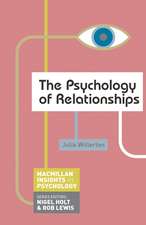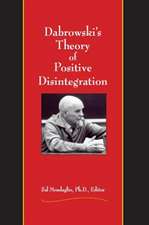Understanding Peace and Conflict Through Social Identity Theory: Contemporary Global Perspectives: Peace Psychology Book Series
Editat de Shelley McKeown, Reeshma Haji, Neil Fergusonen Limba Engleză Hardback – 29 iun 2016
| Toate formatele și edițiile | Preț | Express |
|---|---|---|
| Paperback (1) | 948.58 lei 38-44 zile | |
| Springer International Publishing – 31 mai 2018 | 948.58 lei 38-44 zile | |
| Hardback (1) | 967.02 lei 38-44 zile | |
| Springer International Publishing – 29 iun 2016 | 967.02 lei 38-44 zile |
Din seria Peace Psychology Book Series
- 18%
 Preț: 779.26 lei
Preț: 779.26 lei -
 Preț: 361.05 lei
Preț: 361.05 lei - 15%
 Preț: 639.25 lei
Preț: 639.25 lei - 18%
 Preț: 788.54 lei
Preț: 788.54 lei - 15%
 Preț: 699.28 lei
Preț: 699.28 lei - 15%
 Preț: 646.62 lei
Preț: 646.62 lei - 18%
 Preț: 1690.13 lei
Preț: 1690.13 lei - 15%
 Preț: 645.28 lei
Preț: 645.28 lei - 24%
 Preț: 1044.84 lei
Preț: 1044.84 lei - 18%
 Preț: 945.14 lei
Preț: 945.14 lei - 15%
 Preț: 649.54 lei
Preț: 649.54 lei -
 Preț: 386.39 lei
Preț: 386.39 lei - 15%
 Preț: 697.82 lei
Preț: 697.82 lei - 15%
 Preț: 591.14 lei
Preț: 591.14 lei - 18%
 Preț: 1222.94 lei
Preț: 1222.94 lei - 15%
 Preț: 644.82 lei
Preț: 644.82 lei - 15%
 Preț: 649.22 lei
Preț: 649.22 lei - 15%
 Preț: 697.65 lei
Preț: 697.65 lei -
 Preț: 388.72 lei
Preț: 388.72 lei - 15%
 Preț: 647.08 lei
Preț: 647.08 lei - 15%
 Preț: 638.89 lei
Preț: 638.89 lei - 15%
 Preț: 650.37 lei
Preț: 650.37 lei - 18%
 Preț: 733.15 lei
Preț: 733.15 lei -
 Preț: 398.74 lei
Preț: 398.74 lei - 15%
 Preț: 644.30 lei
Preț: 644.30 lei - 18%
 Preț: 1116.57 lei
Preț: 1116.57 lei -
 Preț: 365.05 lei
Preț: 365.05 lei - 15%
 Preț: 643.99 lei
Preț: 643.99 lei - 18%
 Preț: 1116.26 lei
Preț: 1116.26 lei - 18%
 Preț: 1381.26 lei
Preț: 1381.26 lei - 18%
 Preț: 1595.75 lei
Preț: 1595.75 lei - 18%
 Preț: 779.89 lei
Preț: 779.89 lei
Preț: 967.02 lei
Preț vechi: 1272.39 lei
-24% Nou
Puncte Express: 1451
Preț estimativ în valută:
185.03€ • 193.71$ • 153.11£
185.03€ • 193.71$ • 153.11£
Carte tipărită la comandă
Livrare economică 02-08 aprilie
Preluare comenzi: 021 569.72.76
Specificații
ISBN-13: 9783319298672
ISBN-10: 3319298674
Pagini: 389
Ilustrații: XX, 387 p. 15 illus., 4 illus. in color.
Dimensiuni: 155 x 235 x 27 mm
Greutate: 0.95 kg
Ediția:1st ed. 2016
Editura: Springer International Publishing
Colecția Springer
Seria Peace Psychology Book Series
Locul publicării:Cham, Switzerland
ISBN-10: 3319298674
Pagini: 389
Ilustrații: XX, 387 p. 15 illus., 4 illus. in color.
Dimensiuni: 155 x 235 x 27 mm
Greutate: 0.95 kg
Ediția:1st ed. 2016
Editura: Springer International Publishing
Colecția Springer
Seria Peace Psychology Book Series
Locul publicării:Cham, Switzerland
Cuprins
Social identity and peace psychology: An Introduction Reeshma Haji, Shelley McKeown Jones and Neil Ferguson.- Section 1 Theoretical and Contemporary Issues.- Part I: History and development of social identity theory.- 1. Social identity theory Michael A. Hogg.- 2. Towards a Clearer Understanding of Social Identity Theory’s Self-Esteem Hypothesis Sarah E. Martiny and Mark Rubin.- 3. Between the lines of us and them: Identity threat, anxious uncertainty, and reactive ingroup affirmation – how can antisocial outcomes be prevented? Adrian Lüders, Eva Jonas, Immo Fritsche and Dimitrij Agroskin.- Part II: Social identity as a source of conflict and peace.- 4. Identity and Acculturation Processes in Multicultural Societies Sofia Stathi and Claudia Roscini.- 5. Tyranny and leadership Stephen Reicher, S. Alexander Haslam, Michael Platow and Nik Steffens.- 6. Crowd behaviour and collective action Stephen T. La Macchia and Winnifred R. Louis.- 7. The Role of Social Identity in the Recruitment and Reintegration of Child Soldiers Michael G. Wessells.- Part IV: Contemporary issues.- 8. Symbolic reminders of identity Rebekah A. Phillips DeZalia and Scott L. Moeschberger.- 9. Identity and psychological health Orla T. Muldoon, Robert D. Lowe and Katharina Schmid.- 10. Global Climate Change: A Social Identity Perspective on Informational and Structural Interventions Mark A. Ferguson, Rachel I. McDonald and Nyla R. Branscombe.- Section 2 Worldwide Perspectives.- Part I: Africa.- 11. Social Identity Theory as a Theory of Change: The Case of South Africa Ines Meyer, Kevin Durrheim and Don Foster.- 12. Social Identity and Conflict in Northern Uganda Grace Lapwoch and Kennedy Amone- P’Olak.- 13. Representations of Social Identities in Rwanda Sigrun Marie Moss.- Part II: Europe.- 14. Social Identity Theory and Intergroup Conflict in Northern Ireland Neil Ferguson and Shelley McKeown Jones.- 15. Social Identity in a divided Cyprus Charis Psaltis and Huseyin Cakal.- 16. Building national identity in newborn Kosovo: Challenges of Integrating National Identity with Ethnic Identity among Kosovar Albanians and Kosovar Serbs Edona Maloku, Belle Derks, Colette van Laar and Naomi Ellemers.- Part III: North and South America.- 17. Canada, a fertile ground for intergroup relations and social identity theory Richard N. Lalonde, Jorida Cila and Maya Yampolsky.- 18. Social identities and conflict in Chile: the role of historical and political processes Roberto González, Monica M. Gerber and Héctor Carvacho.- 19. Identity, contact, and health among majority and minority ethnic groups in Mexico and Chile Anja Eller, Huseyin Cakal and David Sirlopu.- Part IV: Asia and Australasia.- 20. Social Identity and Peace in the Modern Middle East: Insights from the United Arab Emirates Angela T. Maitner and Robert Stewart-Ingersoll.- 21. Collective and social identities in Philippine peacebuilding: Does a superordinate Bangsamoro social identity mediate the effects of collective ethnic identity? Cristina Jayme Montiel, Ma. Elizabeth J. Macapagal and Jose Jowel Canuday.- 22. “Aussie Aussie Aussie, Oi Oi Oi”: Situating and Understanding Social Identities in Australia. Siew Fang Law and Cynthia Mackenzie.- Conclusion: The next voyage Shelley McKeown Jones, Neil Ferguson and Reeshma Haji.
Notă biografică
Shelley McKeown Jones is lecturerin the psychology of education at the University of Bristol. She teaches socialpsychology and research methods on the MSc Psychology of Educationprogramme. Her research focuses on how social psychological theories, such asintergroup contact theory and social identity theory, can be used to understandand improve intergroup relations. Shelley has published a number of journalarticles and a book on identity, segregation and peacebuilding in NorthernIreland.
Reeshma Haji (PhD. York University) is anassistant professor in psychology at Laurentian University. She teaches coursesin social psychology and research design and also supervises undergraduate andgraduate research. Her research focuses on intergroup relations of religiousgroups and minority group identities in diverse societies. Dr. Haji haspublished journal articles and book chapters that have applied socialpsychological perspectives to religiousidentity and interfaith relations.
Neil Ferguson (D.Phil., Ulster, 1998) is Professor of Political Psychology at Liverpool Hope University. His research and writings deal with moral development and a number of topics located within political psychology. Professor Ferguson is currently the President of the MOSAIC - Moral and Social Action Interdisciplinary Colloquium and is a member of the Governing Council for the International Society of Political Psychology (ISPP). He also serves on the editorial boards of the Journal of Moral Education and the Journal of Social and Political Psychology and is a trustee of the Journal of Moral Education Trust.
Reeshma Haji (PhD. York University) is anassistant professor in psychology at Laurentian University. She teaches coursesin social psychology and research design and also supervises undergraduate andgraduate research. Her research focuses on intergroup relations of religiousgroups and minority group identities in diverse societies. Dr. Haji haspublished journal articles and book chapters that have applied socialpsychological perspectives to religiousidentity and interfaith relations.
Neil Ferguson (D.Phil., Ulster, 1998) is Professor of Political Psychology at Liverpool Hope University. His research and writings deal with moral development and a number of topics located within political psychology. Professor Ferguson is currently the President of the MOSAIC - Moral and Social Action Interdisciplinary Colloquium and is a member of the Governing Council for the International Society of Political Psychology (ISPP). He also serves on the editorial boards of the Journal of Moral Education and the Journal of Social and Political Psychology and is a trustee of the Journal of Moral Education Trust.
Textul de pe ultima copertă
This volume brings together perspectives on social identityand peace psychology to explore the role that categorization plays in both conflictand peace-building. To do so, it draws leading scholars from across the worldin a comprehensive exploration of social identity theory and its application tosome of the world’s most pressing problems, such as intrastate conflict,uprising in the middle east, the refugee crisis, global warming, racism and peace building. A crucial theme of thevolume is that social identity theory affects all of us, no matter whether weare currently in a state of conflict or one further along in the peace process.
The volume is organized into two sections. Section 1 focuseson the development of social identity theory. Grounded in the pioneering workof Dr. Henri Tajfel, section 1 provides the reader with a historical backgroundof the theory, as well as its current developments. Then, section 2 bringstogether a series of country case studies focusing on issues of identity acrossfive continents. This section enablescross-cultural comparisons in terms of methodology and findings, and encouragesthe reader to identify general applications of identity to the understanding ofpeace as well as applications that may be more relevant in specific contexts.Taken together, these two sections provide a contemporary and diverse accountof the state of social identity research in conflict situations and peacepsychology today. It is evident thatany account of peace requires an intricate understanding of identity both as acause and consequence of conflict, as well as a potential resource to beharnessed in the promotion and maintenance of peace. Understanding Peace and Conflict Through Social Identity Theory: ContemporaryGlobal Perspectives aims to helpachieve such an understanding and as such is a valuable resource to thosestudying peace and conflict, psychologists, sociologists, anthropologists,public policy makers, and all those interested in the ways in which socialidentity impacts our world.
The volume is organized into two sections. Section 1 focuseson the development of social identity theory. Grounded in the pioneering workof Dr. Henri Tajfel, section 1 provides the reader with a historical backgroundof the theory, as well as its current developments. Then, section 2 bringstogether a series of country case studies focusing on issues of identity acrossfive continents. This section enablescross-cultural comparisons in terms of methodology and findings, and encouragesthe reader to identify general applications of identity to the understanding ofpeace as well as applications that may be more relevant in specific contexts.Taken together, these two sections provide a contemporary and diverse accountof the state of social identity research in conflict situations and peacepsychology today. It is evident thatany account of peace requires an intricate understanding of identity both as acause and consequence of conflict, as well as a potential resource to beharnessed in the promotion and maintenance of peace. Understanding Peace and Conflict Through Social Identity Theory: ContemporaryGlobal Perspectives aims to helpachieve such an understanding and as such is a valuable resource to thosestudying peace and conflict, psychologists, sociologists, anthropologists,public policy makers, and all those interested in the ways in which socialidentity impacts our world.
Caracteristici
Provides a strong theoretical framework for understanding intergroup conflict Explores the role that self and group categorization play in conflict and peace Contains applications for social identity theory in conflict situations around the world













